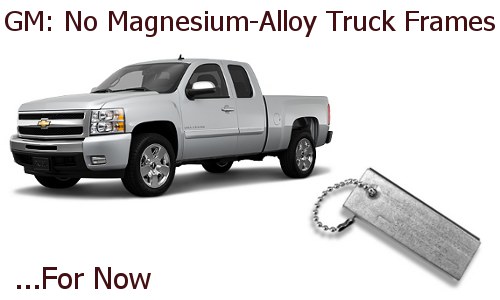GM Says No Magnesium Alloy Truck Frames – At Least Not Yet
Jason Lancaster | Jan 23, 2012 | Comments 2
As fuel economy regulations force automakers to tighten their belts, manufacturers are looking to pull a few different “levers” to improve efficiency. Those levers are drivetrain efficiency, aerodynamics, friction losses, and weight.

An Automotive News report all but says GM won't be producing lightweight truck frames made from magnesium alloy
General Motors, seeking to make their truck as fuel efficient as possible, researched the possibility of a Magnesium alloy truck frame. However, according to a recent tidbit in Automotive News, those plans are dead…at least for now.
Truck Fuel Economy 101
Without fundamentally changing the capability of the modern pickup, there are really only a small number of changes designers can make to improve truck fuel economy:
- Drivetrain Efficiency – This is where most people focus, because more efficient engine technology (hybrid powertrains, turbochargers, direct injection, etc.) is sexy and it’s easy to understand…but it’s not the only way to improve efficiency.
- Aerodynamics and Friction – Once a vehicle exceeds 40-45 mph, a substantial portion of an engine’s power is used to overcome aerodynamic drag. Reduce drag, and you improve highway fuel economy considerably. Same goes for tire friction and drivetrain loss – go with a set of low rolling resistance tires and some 0W-20 motor oil, and you’ll see a slight fuel economy increase.
- Weight – It’s simple, but that’s why it’s so important – cutting vehicle weight is a great way to improve gas mileage.
We’ve seen automakers focus on all three of these areas, with Toyota switching Tundras to full synthetic, Ford releasing a special F-150 package with low rolling resistance truck tires, and we hear that the next generation Tundra will be more aerodynamic too. But as far as weight loss, the only substantial news has been well sourced rumors of frames with magnesium alloys in future editions of the Silverado/Sierra and F150.
Why GM Isn’t Going With Magnesium Alloy Frames In The Next Generation Truck
According to GM North America President Mark Reuss, the plan was scuttled after an analysis determined it would be too costly…pickups would have failed to reach GM’s fuel economy target and would have been less capable than the existing Chevrolet Silverado and GMC Sierra. Says Ruess “If you look at profit on this, if you look at what it takes to actually do this, what it does to the cost of materials, and what it does to the real fuel economy of that vehicle,” the effort fell way short of GM’s targets. He said the end result would be a less capable pickup – a problem, since “there are people who use that to make a living.”
If you cut to the chase, you’ll hear the distinct clang of coins falling into GM’s piggy bank. Magnesium alloy is more expensive than steel, so the only way to make magnesium alloy frames cost effective compared to steel frames is to make them thinner and weaker. Obviously, this is a bad thing, and GM has found other more cost effective ways (direct injection, turbocharged V6’s to replace V8s, etc) to make the 2013 Sierra / Silverado more fuel efficient.
Still, if federal regulators get their way, GM is probably going go have to revisit magnesium alloy frames (and possibly even aluminum frame components) at some point. The simple fact is, vehicle weight reduction is an excellent way to improve fuel economy – especially in pickups. Don’t be surprised if we see GM change their tune about magnesium-alloy truck frames.
Also, just because GM has decided not to use magnesium alloy frames doesn’t mean that Ford, Nissan, Toyota, or Ram won’t go this route in the near future.
via Automotive News (subs req’d)
Related Posts:
Filed Under: Auto News


i got some thing new in this article , why GM motors are not using magnesium alloy truck frames because
“Magnesium alloy is more expensive than steel, so the only way to make magnesium alloy frames cost effective compared to steel frames is to make them thinner and weaker. Obviously, this is a bad thing.”
yes . Cost is the only thing GM motors are looking at.
you know magnesium is a bit expensive than steel.
agree with you . “Will”